People still relate the legend of King Ly Thanh Tong who
went to battle. His Queen knew that he would endure hard times during the
fight, and she made this cake to send to him. When the King tasted the cake it
touched his heart and he named it “Phu
thê” “Phu” means husband and “thê” means wife.
There is also another story, about a business man. One
day he had to travel far away leaving his wife behind. She was very sad and
told her husband that she would think of him only and be faithful to him until
he returned.
But the husband met and fell in love with another woman.
This made the wife very sad. She made the cake and sent it to husband with a
note that said, “Since the day you left on the boat I have counted the waves on
the river, each wave made me think of you”. The husband ate the cake in the
tears and caught the boat home to his wife. The cake is called “Phu Thê” after this event.
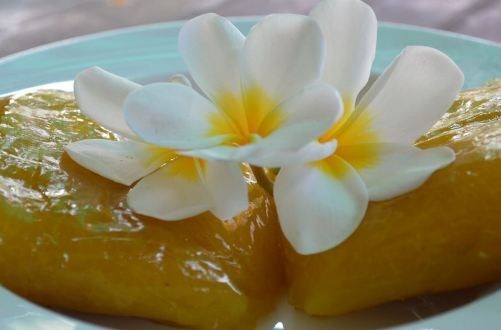
People also bring this cake to wedding parties to wish the new couple good luck for their life together
The people in Dinh Bang village (the hometown of Phu The
cake) also have another story. It is said that King Ly Thanh Tong and his lover
Mrs Y Lan went back to their hometown, Dinh Bang and people dedicated “Phu thê” cake to them. The King tried
the cake and loved it. He said the cake was really delicious and asked that it
be eaten on special occasions. The villagers declared that the cake will be
used in worship on special festivals and Tet, so everyone would benefit. After
this it was dedicated to noblemen and people with high positions in society.
After listening, the King thought for a while and said:
Such a good cake as this should be used more often so
more people are able to enjoy it. There are happy times in a life such as
wedding parties or engagement celebrations,
this cake should be made for these occasion as well. It will be called “Bánh phu thê”.
The villagers in Dinh Bang were very happy upon hearing
these words from the King and understood that people look for happiness as a
couple, so they changed its name to “Phu
thê”
Dinh Bang villagers (Tien Son, Bac Ninh) still keep land
specifically to grow a type of sticky rice named “nếp cái hoa vàng”, which is used to make “Bánh phu thê”
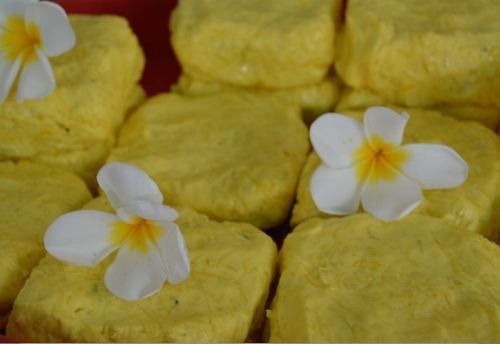
“Phu thê” cake before being wrapped in leaves
The sticky rice is soaked in water, cleaned, drained and
ground into flour. The Powder is finely minced and filtered so only the starch
remains. Each kilogram of rice provides just 300 grams of starch. The flour is
ground for a second time then dried. It should take 15 days later to start to
use the flour to make the cake.
The flour will be dyed using Gardenia augusta flowers
which provide a bright yellow color. To this the liquid from grapefruit flowers
and raw banana fibers which have been soaked in alum. Flour is mixed with sugar to make a dough in which to
wrap the cake.
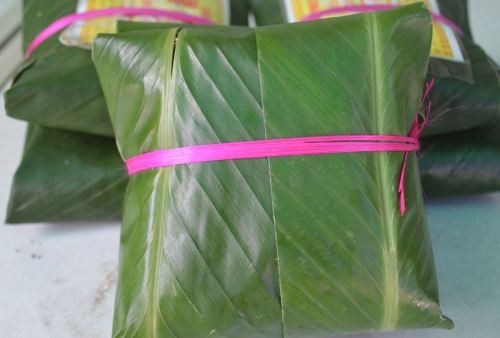
“Bánh phu thê” wrapped.
Eating the outer layer of the cake provides many flavors.
The cool smooth, texture of the sticky rice starch and crispy papaya flavor is
interesting. The mixture in the middle of the cake is made of steamed and
mashed green bean which have been drained and skinned, sugar and coconut fibers
are added to increase its fat content. At the four corners lotus seeds are
placed so when the cake is cut each piece will have a lotus seed inside.
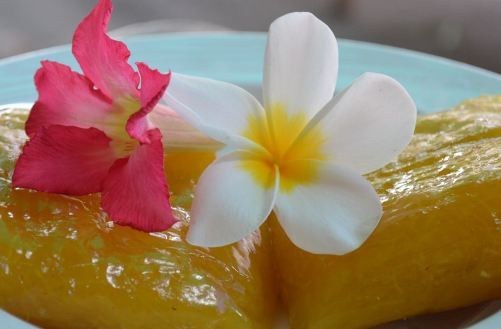
“Bánh phu thê” cake was well cooked
People normally wrap the cake in Phrynium placentarium
leaves or banana leaf and tie the cake with fibers that stripped from the trunk
of “Giang” tree, a member of the
bamboo family (it should be pink to represent Cupid). The cake isn’t made
individually, but in pairs. Cakes are boiled on a wood stove, keeping the fire
at a medium level retains the flavor and aroma.
In the early autumn of 2014, when I were touring the
campus that is cool the smell of frangipani flower in Den Do temple and
pervaded the air. I watched the Tieu Tuong river as well as recalling the voice
of Chi Truong
singing here, and I met Mr Thin Duc Nguyen- titled labor hero - sitting under the branches of the
old Ficus microcarpa L tree.
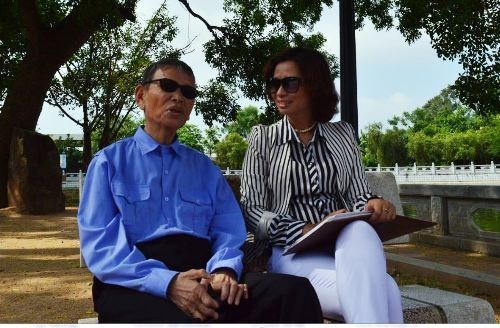
Mr Thin Duc Nguyen and the writer
Dinh Bang villagers called him "the Den Do temple
keeper" because he usually came here to read, and talk with any visitors
and tourists that wanted to know about the temple. He is considered a living
history book of Bac Ninh province,
always enthusiastic and
passionate about every story and relates them by heart.
He said all Dinh Bang villagers know how to make “Phu
thê” cake but only those who know the secret of “the holy fire” when boiling
the cake, could make the best ones. Outside Den Do temple there was a shop
selling “Bánh phu thê” for three
generation. The shop owner is Mrs Nguyen
Thi Thu who has took over this business from her husband’s family. This shop is
the most well-known in Dinh Bang village.
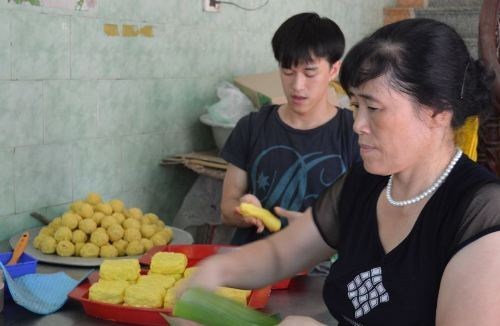
Mrs Thu Thi Nguyen wrapping the cake
Thu’s hands deftly spread and put the powder on thinly,
rolled the crust, with the warmth and
sincerity of husband and wife. It
is the harmony of man with heaven and earth, the harmony between people and
between spouses.
Mrs Thu with her clever and professional ability was
spreading the dough, placing the mixture in the middle, then wrapping them up.
The wrapper covers the mixture as a husband uses his love to protect his wife.
The cake also encompasses the Five Elements philosophy through five colors: the
white of flour and coconut; yellow from Gardenia augusta flowers and yellow
seeds of the green beans; the black color of the sesame seeds; green of the
leaves; and the red fibers used to tie the cake.
“Bánh phu thê” is made of sticky rice and
has the flavor of crispy papaya, fatty green bean, fatty coconut, the light
sweetness of sugar and aroma of banana oil and lotus seeds, All created to form
a great balance in the aroma of the cake as well as the sweetness of the
relationship and love between husband and wife.
Followed by V.H
Dan Tri Newspaper
Extracted from articles written especially for Golden
Spoon Contest 2014 called “A journey to search for traditional rustic dishes”